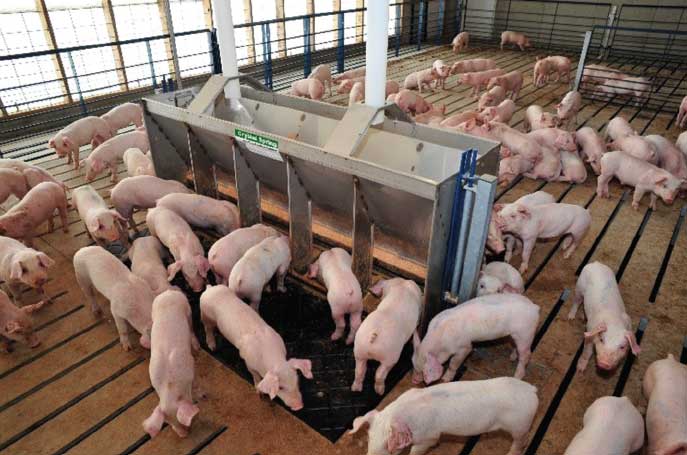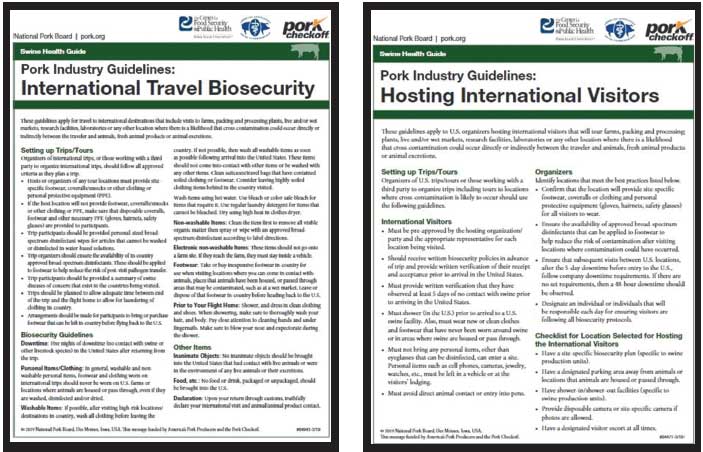News from the National Pork Board (May ’19)
Protecting the United States from foreign animal diseases (FAD) took center stage at the 2019 National Pork Industry Forum in Orlando, Florida. Both delegate assemblies heard directly from US Department of Agriculture’s (USDA) Undersecretary Greg Ibach via a videotaped message (library.pork.org/media/?mediaId=83AEBE94-7B2B-4C11-AED37382AC95D8E5). Undersecretary Ibach outlined the new steps that the USDA is taking to protect the US swine herd.
The Pork Act delegate body also passed advisements at Forum, including three specific to African swine fever. Highlights include:
- Developing best practices and protocols to minimize risk.
- Developing a complete list of all porcine-originated ingredients and their risks for transmission of FADs through feed.
- Committing resources to support, promote and deliver information on critical research needs and results.
According to Dr Dave Pyburn, senior vice president of the National Pork Board’s Science and Technology Department, one of the most tangible actions taken by USDA is the agency’s commitment to add 60 more beagles to the illegal meat smuggling interdiction team. He said, “The industry greatly appreciates this action as we have recently seen how important it is to keep illegal meat products from ASF-positive countries out of the United States.”
For more information, contact Dr Dave Pyburn at DPyburn@pork.org or 515-223-2634.
Checkoff research update: Stemming African swine fever transmission through feed
 In groundbreaking research funded in part by the Pork Checkoff, researchers have confirmed that African swine fever (ASF) transmission to pigs is possible through feed. According to lead investigator Dr Megan Niederwerder, Kansas State University assistant professor, her team of colleagues also have identified the oral dose necessary for ASF infection. She says the next step will be to identify ways to reduce or eliminate the ASF risk. This may include sourcing feed ingredients from countries without foreign animal diseases, using chemical mitigants, following recommended ingredient storage time, and using heat treatments.
In groundbreaking research funded in part by the Pork Checkoff, researchers have confirmed that African swine fever (ASF) transmission to pigs is possible through feed. According to lead investigator Dr Megan Niederwerder, Kansas State University assistant professor, her team of colleagues also have identified the oral dose necessary for ASF infection. She says the next step will be to identify ways to reduce or eliminate the ASF risk. This may include sourcing feed ingredients from countries without foreign animal diseases, using chemical mitigants, following recommended ingredient storage time, and using heat treatments.
The study, “Infectious Dose of African Swine Fever Virus When Consumed Naturally in Liquid or Feed,” has been e-published prior to its May inclusion in the CDC’s Emerging Infectious Diseases journal (wwwnc.cdc.gov/eid/article/25/5/18-1495_article). In light of this additional confirmation that ASF can be introduced into a herd via feed, it’s a good idea to remember the “Seven Key Questions to Ask Your Feed Supplier about ASF” (www.pork.org/blog/seven-key-questions-ask-feed-supplier/).
For more information, contact Dr Patrick Webb at PWebb@pork.org or 515-223-3441.
USDA sets 2020 Dietary Guidelines advisory committee
The US Department of Agriculture and Health and Human Services 2020 Dietary Guidelines advisory committee held its first public meeting March 28-29. Members of the public were invited to attend the meeting in person or via webinar. The independent advisory committee, which includes 20 scientists, reviews scientific evidence related to developing the 2020-2025 Dietary Guidelines for Americans. As this committee sets nutritional policy for the United States, the Pork Checkoff Science and Technology department closely monitors the committee’s work and offers registered dietitians and others with the best available science related to fresh pork in the diet.
For more information, contact Adria Huseth, AHuseth@pork.org or 515-223-2632.
Checkoff collaborates to extend research funds
The National Pork Board, the Foundation for Food and Agriculture Research, and the National Corn Growers Association are working together to bring more than $2 million in combined funding to develop novel technologies to identify and monitor indicators of pig health, welfare, and productivity. Together these organizations have developed common research priorities and jointly funded seven research projects beginning in 2019. Through a focus on continuous improvement, pork producers are on the forefront of “smart farming” through improved management practices.
For more information, contact Dr Chris Hostetler at CHostetler@pork.org or 515-223-2606.
Fact sheets updated for international biosecurity
 With African swine fever in China and other foreign animal diseases spreading worldwide, US swine veterinarians and pig farmers need the best available information to help mitigate these herd health risks. To help with this, the Pork Checkoff and its partners, the Center for Food Security and Public Health and the American Association of Swine Veterinarians, recently revised two fact sheets—the Pork Industry Guidelines: International Travel Biosecurity and Pork Industry Guidelines: Hosting International Visitors. Whether you are headed overseas and will have exposure to pigs, pork, or other high-risk items or areas or will be hosting an international group on a farm or clinic, now is the time to get these updated and free fact sheets. They can be found at www.pork.org/fad and at the Pork Store via www.pork.org in downloadable form or hard copy.
With African swine fever in China and other foreign animal diseases spreading worldwide, US swine veterinarians and pig farmers need the best available information to help mitigate these herd health risks. To help with this, the Pork Checkoff and its partners, the Center for Food Security and Public Health and the American Association of Swine Veterinarians, recently revised two fact sheets—the Pork Industry Guidelines: International Travel Biosecurity and Pork Industry Guidelines: Hosting International Visitors. Whether you are headed overseas and will have exposure to pigs, pork, or other high-risk items or areas or will be hosting an international group on a farm or clinic, now is the time to get these updated and free fact sheets. They can be found at www.pork.org/fad and at the Pork Store via www.pork.org in downloadable form or hard copy.
For more information, contact Dr Patrick Webb at PWebb@pork.org or 515-223-3441.